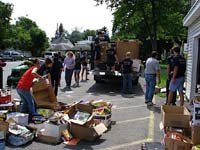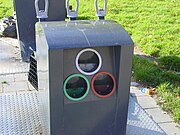Tuesday, October 20, 2009
Mesej Kepada Bekas Murid SK Selama
Peristiwa Yang Lalu Di Sekolah baru-baru ini:
Majlis Perjumpaan Bekas Murid SK Selama berjaya diadakan pada 22 Sept. 2009 . Persatuan Bekas Murid SK Selama Jln. Menteri memberi peluang kepada semua bekas murid untuk pulang ke sekolah rendah mereka. Mereka dapat bertemu kembali dengan kawan -kawan lama untuk mengeratkan silatulrahim. Selain itu, mereka dapat menabur bakti kepada sekolah dengan pelbagai cara. Ada yang memberi sumbangan kewangan, tenaga dan ide. Ahli Jawatankuasa telah bermesyuarat untuk membuat rancangan untuk persatuan ini. Harap sekolah dan murid-murid menerima manafaat daripada usaha ini. Setinggi-tinggi terima kasih diucapkan semua yang telah membantu menjayakan aktiviti persatuan ini.
Untuk makluman semua bekas murid:
i. Bekas murid dijemput menjadi member portal www.skselama.net . Anda boleh menyertai forum yang ada.
ii.Sila download borang alumni dari portal rasmi www.skselama.net , isinya dan email kepada
skselamaperak@gmail.net .
iii. Bekas murid dijemput menjadi member Alumni SK Selama di Facebook Group dan menyertai 'discussion' dan mengongsi ide, pengalaman. Sila buat sumbangan kepada Album Foto , koleksi foto lama.
Terima kasih.
Sunday, August 23, 2009
SILA MELAWAT PORTAL RASMI SEKOLAH YANG BARU www.skselama.net/v7
USAHA MENAMBAHBAIKI BLOG P&P INI SELEPAS UPSR
SELAMAT MENDUDUKI UPSR KEPADA SEMUA MURID TAHUN 6
Peringatan kepada semua murid Tahun 6
Persediaan terakhir amat penting. Jangan ponteng kelas tambahan dan jangan lupa buat semua pembetulan kertas-kertas ujian yang dibincang. Bertenang dan jaga kesihatan diri dengan baik.Tidur secukupnya. Walaupun berpuasa, hadapi cabaran menghadapi UPSR dengan tabah. Kami mendoakan kejayaan semua murid Tahun 6 dalam UPSR.
Sunday, July 5, 2009
ARTICLE-WASTE DISPOSAL AFFECTS THE ENVIRONMENT



Today, the world faces problems caused by waste disposal and it is time we play our role to save the environment.



What is waste?



Waste management is the collection, transport, processing, recycling or disposal and monitoring of waste materials. It is done to reduce their effect on health and environment. Waste management can involve solid,liquid,gaseous or
Waste management practices differ for developed and developing nations, for urban and rural areas and for residential and industrial producers. Management for non-hazardous residential and institutional waste in town areas is usually


Littering is the most common visible form of solid waste pollution. The most common irresponsible practice is disposing of waste in public places. Despite signboards forbidding littering, the public still ignore them and continue littering.
Marine debris



Marine debris known as marine litter, is human-created waste that has been deliberately dumped or accidentally become afloat in a lake, sea, ocean or waterway. Four fifths of the ocean debris is seaward from landfills, and washed seaward by storm drains. Other forms of pollution include illegal dumping and leachin
Illegal dumping



Landfills
Rats, stray dogs and flies are a common sight. People cannot bear the unpleasant smell when the wind blows it to their house. It is very unhealthy to live near a poorly managed landfill.



Incineration is a disposal method that involves combustion of waste materials. Incineration converts waste materials into heat, gas,steam and ash. Incineration is carried out both on a small scale by individuals and on a large scale by industry. It is used to dispose of solid,liquid and gaseous waste.
It is a practical method of disposing of certain hazardous waste materials such as biological medical waste. Incineration is common in Japan where land is scarce. Waste -to- energy or energy-from-waste are broad terms for facilities that burn waste in incinerators
.jpg)


PVC, LDPE, PP, and PS (see resin identification code) are also recyclable, although these are not commonly collected. These items are usually composed of a single type of material, making them relatively easy to recycle into new products. The recycling of complex products (such as computers and electronic equipment) is more difficult, due to the additional dismantling and separation required.
Plastic recycling is recovering scraps or waste plastic and reprocessing the material into useful products.
Because of the many types of plastics , they each carry a resin identification code and must be sorted before they can be recycled.
Paper can be recycled by reducing it to pulp and combining it with pulp from newly harvested wood as the quality of the paper decreases after recycling. Some types of paper are difficult to recycle
Glass can be collected by trucks and bottle banks . It may be sorted out into colour categories. At the glass recycling plant, the glass cullet is cleaned. The cullet is crushed and added to a raw material in a melting furnace. It is blown or melted into new jars or bottles.
Aluminium cans,scrap metals, appliances and building materials are detected by electro magnets. They are melted down and turned into new metallic products.


Textile or clothings and shoes can be sorted out and donated to the needy. This recycling practice is good. In fibre reclamation mills, textiles are sorted out according to types and colours. The recycled textiles are redyed . Therecycled yarn can be woven or made into cloth.
Timber recycling is popular as consumers would buy recycled timber products as they would like to protect the trees and forest from being destroyed.
Greenpeace viewed recycled timber as an environmentally friendly product.
Biological Reprocessing


In addition, water gas from the process (such as methane) can be captured and used for generating electricity. This method is to quicken the natural process of decomposition of organic matter.



Anaerobic digestion component of Lubec k mechanical biological treatment plant in Germany, 2007.
Recycling through thermal treatment ranges from using waste as a fuel source for cooking or heating, to fuel for boilers to generate steam and electricity in a turbine. Solid waste can also be converted into solid , liquid and gas products. The g as is then burnt to produce electricity and steam.

Old clothes and shoes can be donated to the poor. Plastic sheets and big pieces of cloth are sent to countries which need them.
Beautiful and creative handicrafts are made out of unwanted items. They are valuable and sold as souvenirs and presented as gifts to loved ones. Unique structures and landscaping are created from recycled items.



Waste hierarchy



Local authorities or private industry handle waste collection. Where there is no formal waste collection system like in some rural areas, rubbish is burnt and buried. Some countries practise curbside collection. Big recycling bins are provided.
Residents of the area separate their rubbish before throwing them into the bins. They bring their recyclable items to collecting centres. Some agencies or groups of people will provide them and send them to be recycled properly.
However mostly, the recycling process is expensive and getting the public cooperation is difficult. Therefore, many people just dump their rubbish anywhere.
Education And Awareness
Education and awareness in the area of waste and waste management is more important globally. The Talloires Declaration shows concern about the seriousness of environmental pollution and degradation and the depletion of natural resources.
Air pollution , accumulation and distribution of toxic wastes, destruction and depletion of forests,soil and water. The depletion of the ozone layer and emission of "green house" gases threaten the survival of humans and other living things. There is a need to prot ect the earth and environment for the future generations.
Various organisations such as SAM ( Sahabat Alam Malaysia )or Friends of The Earth Malaysia, Friends of the Earth International, Greenpeace and others. They organise awareness campaigns and educate people about the importance of the appropriate way of disposal of rubbish and recycling recyclable items. School teachers and parents together play an important role in educating the young. They should be good role models and practise what they teach.
Supermarkets and private companies could sponsor environmental projects such as recycling and cleanliness campaigns.


BACKYARD SALE
CHILDREN WITH THEIR CREATIVE RECYCLED ITEMS
COOPERATION AND DISCUSSION ON ENVIRONMENTAL ISSUES
CELEBRATE EARTH DAY STOP USING PLASTIC BAGS

Websites:
Environmental Groups
Greenpeace - http://www.greenpeace.org/
Sahabat Alam Malaysia (SAM) or Friends Of The Earth Malaysia
www.foe-malaysia.org
Friends Of The Earth International - http://www.foei.org/
Searches made with Wikipedia
OUR THANKS AND APPRECIATION:
AND EN MD RAVI, ICT OFFICER




















